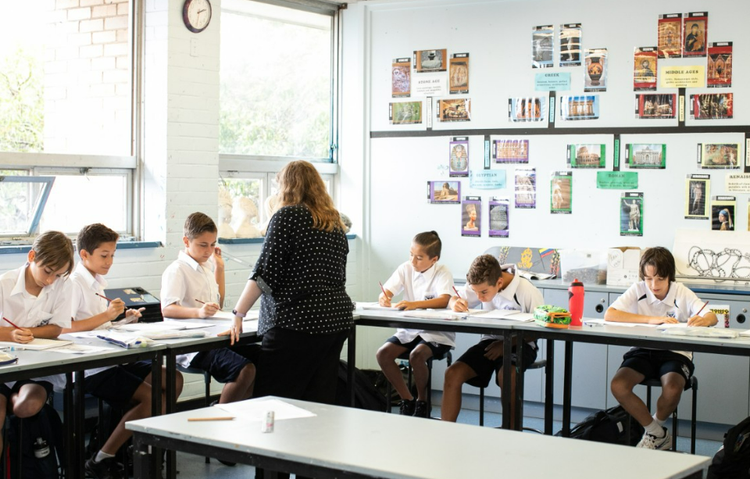Learning
At our school, we teach the NSW curriculum and offer many different subjects to support each student’s learning. We know that development of skills in literacy and numeracy are the building blocks for learning and for everyday life. Our teachers use effective teaching strategies to help students achieve their goals.

Why choose us for your child’s learning?

Strong foundations
We focus on the skills your child needs to succeed in school and beyond. This helps them feel confident and prepared for the future.

High-quality education
We offer a range of subjects to match what students enjoy and want to learn about. Our skilled teachers support every student to find what they love, do their best and succeed.

Inclusive and personalised learning
Our teachers adjust how they teach to suit your child’s needs, interests and learning pace. We make sure every student feels confident and supported.

Extension opportunities
Some students are ready for more challenges. We offer open-ended tasks, enrichment programs and support. We help all students to reach their full potential.
What students learn
Students learn a wide range of subjects in the NSW curriculum. They build skills, think creatively and prepare for life beyond school.
At our school, students can take part in special religious education (SRE) or special education in ethics (SEE) classes, depending on what’s available. These classes are delivered by approved providers.
When enrolling your child, you’ll be able to choose an option from the approved providers offered at our school. Students not attending SRE or SEE are given supervised alternative meaningful activities.
You’re welcome to change your choice at any time. Just let us know in writing or use the online form (if available at our school).
For more information, visit the department’s website or contact us.
At our school, we give the right support to help advanced or talented learners grow and do their best.
We notice these students early. They may learn quickly or show strong skills in creativity, leadership, problem solving or sport. We help them stay challenged with lessons and activities that match their strengths.
Contact us to learn more about how we support high potential and gifted learners.
Matraville Sports High School is proud to offer the Duke of Edinburgh's International Award. The Award is a non-competitive self-development program available to all young people which encourages them to set and achieve goals at a level appropriate to their needs and aspirations.
The Duke of Ed Framework is well-regarded by the community and employers. Completion of a Duke of Edinburgh International Award highlights the participants’ skills and qualities, such as:
- Resilience
- Consistency
- Teamwork
- Leadership
The Duke of Edinburgh's International Award - Australia provides an internationally recognised, self-development program for people aged 14 to 25. The program equips young people with the opportunity to undertake a variety of voluntary and challenging activities.
Our learning approach

Our school uses explicit teaching. This means we clearly tell students what they are learning, why it is important and how to do it step by step. Explicit teaching helps students understand new ideas by breaking them into smaller parts.
Learning at our school is student-centred, inclusive and practical. We are committed to equity and access. We support all learning styles and needs. Our teachers use proven teaching strategies. They take part in ongoing professional development to stay up to date with best teaching practice.
Our learning approach includes:
- real-world learning: hands-on tasks, group work and exploring new ideas
- technology: to help students learn and build digital skills
- flexible teaching: the right support for each student, with a focus on wellbeing
- community connections: through excursions and local programs.
Helping students progress

We support every student’s academic progress by:
- checking their progress and giving clear and timely feedback
- setting learning goals with each student
- giving extra help with personalised plans and support from specialist staff
- reporting on each student’s learning progress so parents and carers know how their child is doing
- providing targeted literacy and numeracy support in small groups
- making wellbeing part of everyday learning
- working with families to support learning at home and school
- helping students through transitions, like starting school or moving to a new stage of learning.
Learn more about additional learning support at our school.
Want to know more about our subjects?
We can connect you with the right teacher or staff member.
Student opportunities and activities
Discover clubs, sports and other activities your child can enjoy at school.
Our principal and staff
Get to know our principal and staff, who work together to create a positive school culture.